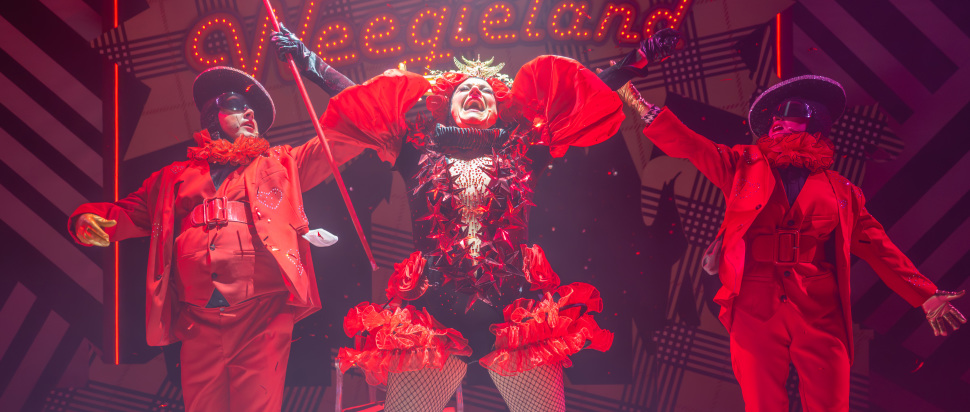Johnny McKnight and Sally Reid on the Tron panto
With Gallus in Weegieland, panto veterans Johnny McKnight and Sally Reid reflect on the Tron’s tradition of self-aware pantomime – and how a certain scrappy joy remains at the heart of it all
Johnny McKnight’s latest panto, Gallus in Weegieland, is one of several Christmas shows across Scotland proclaiming the festival season open with a return to basics. In many ways, the craft of writing a pantomime – usually based on traditional children’s stories, otherwise stories most know – entails such a return.
We sit down with McKnight and the director of Gallus, Sally Reid, to discuss everything from Scottish panto, the politics of representation and self-referentiality in modern-day pantomime, the Tron Theatre, and their experiences with the medium. Naturally, this included the topic of source material, since McKnight has done everything from Babes in the Wood – i.e., Weans in the Wood, currently playing at the Macrobert Arts Centre, Stirling – to Lewis Carroll’s Alice in Wonderland. Gallus also indicates a kind of return for McKnight, who has described the production currently gracing the Tron Theatre’s auditorium as a “reworking” of his 2017 text to feature new cultural references – e.g. Ozempic intake – and in doing so, brings the whole experience up-to-date. Indeed, Gallus is a revival, but feels completely new: in McKnight’s words, “comedy ages like vinegar” and warrants updating where possible.
It was while studying performance, live art, and devising in Glasgow that McKnight realised what he calls the “subversive” potential of panto. The Tron pantos under Forbes Masson, one of the associate artists at the Royal Shakespeare Company who began his career at the Tron, exemplify some of the most self-conscious, socially savvy offerings in recent memory, which Reid recalls. She remembers starring in Masson’s 2005 hit Weans in the Wood, in which she had to perform a wordy political patter song. These pantos were “anarchy” and “just bizarre, but in a brilliant way,” Reid tells me; if these were to be put on anywhere, they would be staged at the Tron, which has typically differed in its offerings from the commercial panto in Scotland.
The Tron’s uniqueness as a venue partially boils down to its self-subsidised status, and how this bears on the contents and concerns of its programming – but especially productions with a unique tendency to the self-aware. In the case of panto, as McKnight explains, the characters could poke fun at the budget limitations apparent in the show’s scenic design, or the absence of a specific set-piece required by a story (the storm in The Wizard of Oz, for example), again because of budget. The self-awareness of panto can be used to draw attention to politics – hence the importance of keeping up-to-date, or revitalising a production like Gallus to tackle current affairs. In this way, the Tron, maybe more than its commercial counterparts, exhibits a strong history of the progressive subversion which McKnight says first drew him to the medium.
In Gallus, we find a non-traditional panto with explicit emphases on inclusivity, acceptance, and being yourself: “a madcap journey,” says Reid, into a fantasy wonderland through which our protagonist, Alice, will end up becoming herself. It is probably unsurprising that a panto with McKnight’s typical mishmash of ironic cultural allusions and emotional sincerity, coupled with a “bold and big” (Reid’s words) social ethos about inclusivity, has been met with such an enthusiastic audience and critical response. Given the present crises of inclusivity and freedom of expression, we can locate the nerve-endings of political outcry within Gallus’s fantasia, indeed the tracery of the Tron’s progressive heritage.
It’s true enough that what you see on stage does make a difference, and the theme of inclusivity in Gallus also finds its incarnation in a dynamic cast, including the inimitable Louise McCarthy who fills McKnight's shoes as the Queen of Hearts. Importantly, McCarthy – who also starred in Aganeza Scrooge under Reid's direction – takes on the panto dame this time around, thus opening up an exclusive sphere. Since McKnight started working in panto, the field has certainly become more progressive, which he remembers as being largely homophobic and sexist back then – but opportunities for women to play the dame are still slim today. One look at McCarthy in this role will have you asking why.
It’s interesting how different McKnight and Reid’s introductions to panto were. McKnight recalls seeing his first panto in Ayr and being terrified by the ugly step sisters; he didn’t catch another until he’d turned 20. Reid, conversely, remembers seeing pantos in Perth as a child and thinking, “They’re talking to us. They’re talking to me” – meaning, they were about things and people she recognised. She even describes these pantos as a "turning point” for her, and possibly one of the reasons she pursued theatre-making.
But both ended up entrenched in the Scottish panto scene, and the Tron panto in particular. Their stories are a testament to the myriad ways panto as a medium reaches people – and the different age groups it can appeal to, whether that’s a child entranced by the essential themes of good versus bad (good wins), or an adult audience member enticed by a panto’s political messaging. Or maybe, as McKnight says, it is the capacity for a panto – when it’s really working – to help “folk forget the world is outside, to forget it’s raining,” that accounts for its enduring popularity. There’s something undeniably true about the fact panto attracts so many different types of people, of different ages, walks, and backgrounds, and the Tron’s latest is absolutely no exception – an irresistible rabbit hole for anyone and everyone, we’re all of us invited.
